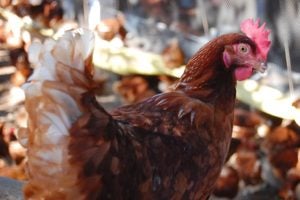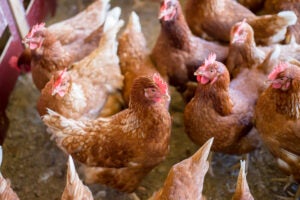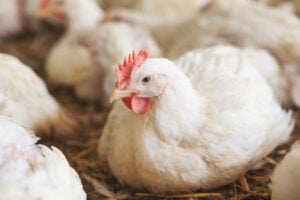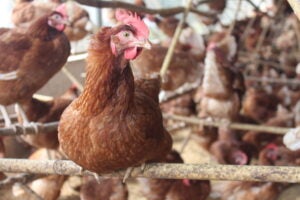“We just can’t justify putting sows in farrowing crates any more.” – a British farm manager shares insights into the impact of confinement for sows, and perspective on how the sector must change
HSI/UK made contact with a British pig farm, which wishes to remain anonymous. The farm has used farrowing crates for over 35 years but the farm manager now believes that farmers should be supported financially to stop using crates, because of the suffering they cause. This is the testimony of the farm manager, who wants the public and politicians to understand the tragic impact crate confinement has on these intelligent animals. The farm agreed for HSI/UK to re-home two sows at the end of what the industry considers their productive breeding lives, in order for their stories and experiences to be understood.
Why are farrowing crates used?
Farrowing crates are supposed to protect piglets from being crushed but they don’t always do that. Piglets are pretty resilient and can be lain on for a short time and survive but the problem in crates is that once the sows are down they can’t be bothered to get back up again. It took them ages to go down because it was so uncomfortable, so even if they realise there’s a piglet under them they’re like, ‘no, I’m not getting up’. These crates are not a lifesaving cradle like some people have said they are, particularly when we’ve got huge litters with weak piglets.
How do the sows react, being locked into farrowing crates?
When they first go into a farrowing crate, it’s very, very stressful and scary for them. It’s a dead end, and then they’re suddenly shut in and then they can’t turn around or anything. Our first time mothers sometimes try to escape the crates, and they’ll bite and paw and try to back out. I’ve had gilts escape, tried to literally climb out of the crates, it’s hard watching them so upset. When an animal’s telling you ‘I do not want to be in here, I’m going to do my best to escape’ and then you’re like, ‘I’m going to have to tie you in’, that feels cruel. It bothers me every day. But you know, in order to do your job every day, you have to park it.
Over the course of their life they farrow multiple times, by the time they get to their sixth or seventh litter, they are still reluctant to be shut in the crates but they’re more just resigned to it. Over time they get emotionally broken, it’s sad.
When we let them out of the crates they’re just desperate to roll in mud, water, anything cool to wallow in. They remind me of dogs at the beach.
What are some of the behavioural challenges for a sow kept in a crate for several weeks?
They have a strong desire to nest build and they can get very frustrated trying to do that in a farrowing crate. We provide enrichment like a handful of fresh straw every day but it’s still not a lot. They are rooting at the bars and rooting at the concrete and all they want to do is make a nest, you know, for the safety of their piglets.
Nesting helps them to release all the hormones that are required for the farrowing process, and we’re essentially shutting that down by restraining them in a non-enriched environment. It can have a really negative consequence on the sow and the piglet’s relationship and sometimes the sow will bite and even kill her own piglets. Luckily we don’t get it very often, but all sorts of horrible things happen.
Do the crates cause physical pain and suffering?
We get a lot of shoulder sores because they’re lying on their sides longer and they often get so, so unbothered about moving posture that it’s essentially a pressure sore. If we don’t treat them quickly the piglets could start licking and eating them and then the wound gets really big.
We’ve seen pigs’ height and length increase significantly over the last 20 years, they’re bred to be bigger and bigger and the crates haven’t changed. So the pigs no longer fit into the crates as well as they used to, we have a few sows that are too big for the crates, so they’re essentially touching the bars all the time. For some of the longer sows there’s no room for their head, so when they lie down, their head is on top of their feed trough and drinker. That must be so uncomfortable for them stuck in that position for four weeks, it actually makes me wince. We had to develop extension bars to make the crate bigger.
Pushing the sows to have larger litters is also a problem for the sows and the piglets. We artificially inseminate using semen sent through the post. We changed our supplier and started getting a lot of enormous litters of 18, 19, 20 piglets, where there’s more piglets than then sow can feed. We had to put excess piglets down regularly. Between increasing the physical dimensions of the sows and increasing the number of piglets born, we’ve pushed them into being like an absolute machine, it can’t carry on indefinitely this way, being all about productivity at the expense of the animals’ welfare.
They also damage themselves on the crate trying to lie down or flip over, they can catch their teats with their own feet and rip them, and damage their vulvas on the back of the crate.
And the piglets’ space, for the weeks they’re in the crate, becomes very, very constricted very quickly. They try to play but the only space away from the sow is about the body length of a piglet, so there’s really no room to manoeuvre. And the piglets can get sore knees, elbows and feet from the floors too. The bigger the litter the more we see piglet sores that can lead to infection and lameness.
The law requires that farms provide enrichment materials that enable pigs to fulfil their essential behavioural needs. Is that possible in practice?
Our standard enrichment is they get about half a bucket of wood shavings and they get about half a leaf of straw every day, and the sows eat a lot of straw, so a lot of that will vanish. We try a range of enrichment, hessian sacks are good, but you’ve got to be on enrichment all the time not just put it in and forget about it. The blocks on chains can get snagged around the top of the crate so that they can’t get hold of them, or they can push the straw out of reach then that’s really frustrating. If they weren’t given any enrichment at all, then they will absolutely smash up their face during nesting, biting at the bars, biting at their food trough.
We speak to the girls every day, give them a scratch – they love a scratch and they get all squeaky and you know they love those little bits of interaction with us. It’s like the highlight of their day, but imagine 2 minutes, you know, in 24 hours where somebody’s showing you some appreciation. It’s not very great. Seeing them sitting there depressed day after day after day with their heads hung low, it just screams depression to me.
We quite often have pigs who essentially just go into a glazed vegetative state where their sole purpose is to just lie still and provide milk, and they barely eat. Sometimes they lose 100 kilos in three or four weeks and it’s horrible. And if the sow isn’t feeding then her milk can be affected, which can reduce the weaning weight of the piglets. We try everything to get them interested in eating again.
You’ve looked at free-farrowing pens, what are the advantages there?
In the farrowing pens you see them throwing the straw around making their nest and they’re really active and it’s clearly such a big box ticked for them. Seeing how they interact physically, being able to touch their piglets and move around and nurse them and then sometimes tell them off as well, it’s all so much better than what they experience in crates.
Temporary crating wouldn’t be so bad if it was only used to protects the piglets for up to five days, but often the sows just don’t get let out after that time, and sometime they get shut in before nesting. And there’s nobody inspecting that kind of thing.
What are the barriers to farmers wanting to move away from crates?
It will be the meat price, I would say. Unless we could get a quality assurance sticker, with a big enough mark up to pay for the cost. How are we supposed to invest in big welfare changes when we’re getting so many cheap meat imports from the continent and from elsewhere outside of the EU?
It feels like British consumers should be asking more questions and given more answers about their food, where it was raised and how it existed, the food miles. We also have the problem that people want cheap meats 24/7. It used to be a valued product and now it’s a pocket snack.
What are your hopes for the future of farrowing in British pig farming? And what should the Government do?
I really hope that we move on from this sort of barbaric cage. It’s a horrible system and there are so many better ways out there, with less suffering, less injuries, stress and illness. It doesn’t have to be this way, there are loads of different kinds of free farrowing systems but why aren’t retailers and consumers asking for them? It feels like they don’t know the reality of what’s going on behind farm gates. I think we do really need to change the script.
Yes, indoor free farrowing is more expensive, but we need to find the money to shift. We’ve got to have support from government – both the money and the right policies. I don’t think putting sows through weeks of crate confinement six, seven or eight times in their lives can be justified any more.























